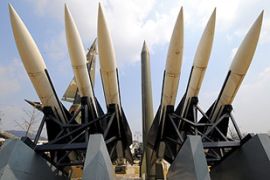Two Koreas argue over warships
North claims warships entered its territorial waters amid increasing hostility.

North Korea has announced the suspension of all dialogue and the closing of its border to South Korean officials as both sides continued to trade barbs.
Earlier this week, the South Korean president was labelled a “conservative political charlatan”, “traitor” and US “sycophant” for his tougher policies on the North, which includes linking aid to nuclear disarmament.
Aside from the rhetoric, Pyongyang has test-fired missiles in the past few days and, last week, accused South Korean ships of breaching a disputed sea border.
| Escalating tensions |
|
February 25 Lee Myung-bak takes office as South Korean president. Promises to end unconditional aid to North, saying Pyongyang must improve human rights and return Southerners held since the 1950-53 Korean war
March 26 South Korean military chief tells MPs military will strike suspected nuclear weapons site in North if Pyongyang attempts to attack South with atomic bombs
South Korean foreign ministry says it will back a UN resolution condemning North’s human rights record, ending a decade of reluctance by previous administrations
March 27 Pyongyang expels South Koreans working at joint industrial zone in the North
March 28 North Korea test-fires missiles into sea and warns it will “mercilessly wipe out” any South Korean warships that violate its waters
March 29 North warns inter-Korean reconciliation may be in jeopardy, implements ban on South Korean officials entering the country
March 31 North Korea threatens to turn the South to “ashes” after South’s warning of pre-emptive strike in response to nuclear attack
April 1 North accuses South Korean president of being US stooge and causing instability on peninsula
April 2 South’s defence ministry tells North to stop verbal attacks in first official response April 3 Pyongyang announces freezing of talks and closing of border to South Korean officials. |
See also
Timeline: The Two Koreas
Analysts say the North may stage more missile tests, or naval manoeuvres near the disputed Yellow Sea border – the scene of bloody clashes in 1999 and 2002.
The North’s hostile reaction came after Seoul refused to apologise for recent remarks by its military commander which the North interpreted as authorising a pre-emptive military strike.
Lee’s predecessors had practiced a “sunshine” policy of engagement, under which aid and investment worth billions of dollars flowed into the North.
On Thursday, Lieutenant-General Walter Sharp told senators in Washington that South Korea lacked adequate anti-missile defences to counter a missile threat from the North.
Sharp, in a written response to the Senate Armed Services committee, said Pyongyang had 13,000 artillery systems and 800 missiles.
North Korea had 250 long-range artillery systems capable of reaching Seoul, he said.
“North Korea still has the capacity to inflict major destruction and significant military and civilian casualties in South Korea with little to no warning,” he wrote.
South Korea’s defence ministry had said the North was deliberately misinterpreting Seoul’s objectives and remarks by its officials and told Pyongyang to stop its verbal attacks on Lee.
But Pyongyang continued with its rhetoric, accusing Seoul of driving inter-Korean relations to “catastrophe”.